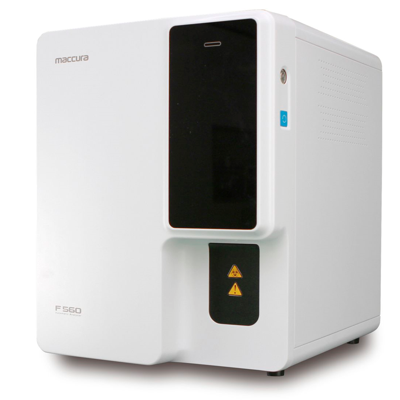- Advanced Technology Special fluorescent staining solution will dye DNA or RNA blandly while 2nd Generation chemistry staining reagents will dye Enzymes/particles in cytoplasm. We know that different cell has different concentration of DNA or RNA , which cause the depth of dying is different.the more DNA or RNA , the stronger fluorescent signal. Since the nucleic acid is the most specific part of cell, so the 3rd Generation is more sensitive to distinguish different leukocyte, especially the abnormal cells. Combine 3rd Generation technology with flow cytometry, A single-cell stream quickly passes through a channel in the middle, and every passing cell is detected by three beams of light from three directions to get size, granularity and nucleic acid information:FSL (Forward Scattered Light) mainly reflects the size of the cells,SSC (Side Scattered Light) mainly reflects size and number of particle in cells
SFL (Side Fluorescence Light) mainly reflects the concentration of nucleic acid.
Smart graphical analysis
3D scattergram for accurate WBC differentiation and pathological sample flag
Specifications Measurement principle Nucleic Acid Fluorescence Staining and Flow Cytometry Parameters 24 report parameters (WBC, RBC, HGB, MCV, MCH, MCH-C, RDW-CW, RDW-SD, HCT, PLT, MPV, P-DW, PCT, P-LCR, BASO#, BASO%, NEUT#, NEUT%, EO#, EO%, LYMPH#, LYMPH%, MONO#, MONO%)
4 research parameters (IG#, IG%, OTHER#, OTHER%)4 Graphs (2D and 3D scattergram analysis, 3 histograms)Throughput 60 tests/h Test Mode CBC / CBC+DIFF Sample Type Whole blood / Capillary blood / Pre-dilution blood Sampling Method Manual sampling Sample Volume 20 µl Reagents GD-5 (diluent) LH-5 (HGB Lyse)
LD-5 (DIFF Lyse)
DD-5 (Dye)
Power requirements 100-240V ≤ 250VA, 50/60Hz Dimensions 550x700x600mm Weight 55kg

Maccura F560
Maccura has brought to market the third generation technology of hematology analyzer
Maccura F560. A compact 5 differential analyzer, with a capacity of 60 tests per hour, with
reliable performance including blood that has been collected from the patient for a long
time (up to 4 days) as well as samples with abnormal parameters.
Product PDF:


